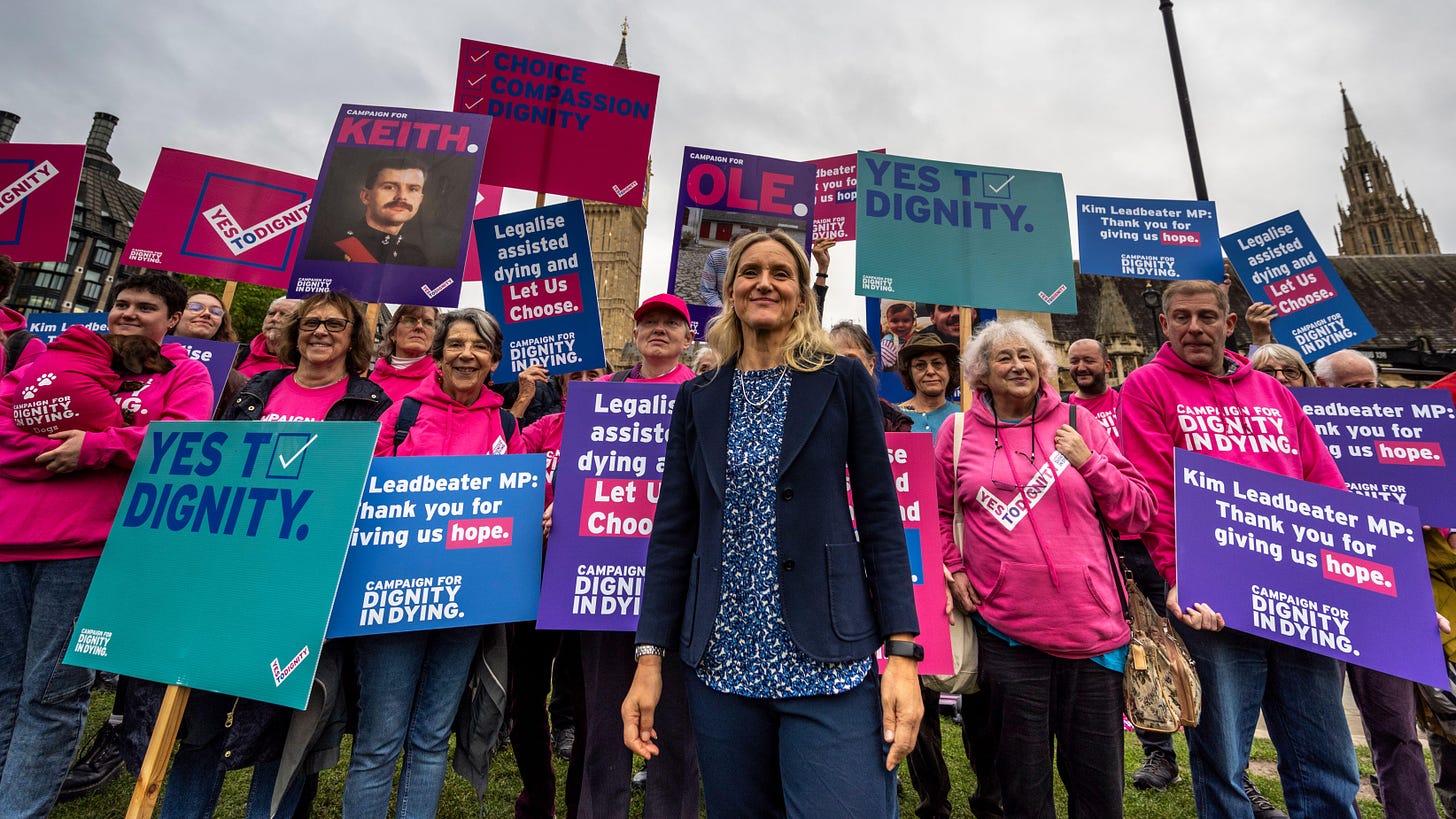Starmer’s botched handling of assisted dying calls into question his political skills
Sir Keir is far less committed to the cause as PM

It looked like an easy win to prove that this is a progressive new government after its slow and clumsy start. Of course the proprieties on a moral issue would be respected and it would be introduced as a free vote conscience measure. In the end though Sir Keir Starmer and his cohorts of shiny new MPs would ensure that assisted dying got into British law. (The Scottish Parliament have been told that such a decision is not in their “competence”)
Opinion polls confirmed that a majority of the public favour being helped to end their own lives in extremis. Esther Rantzen, the crusading TV star, took up the cause, emotionally underpinned by her own stage four lung cancer diagnosis. "I'm personally in favour of changing the law", Sir Keir Starmer told her in a phone call during the election campaign, “Esther, I can give you that commitment right now."
What could possibly go wrong? Parliamentarians taking pains to do their job to consider all aspects of the question is one possible answer. Whichever way the process goes MPs want to tread carefully. They know they will come under vicious attack from advocates of the losing side, much but not all of it online.
Sensing a backlash even Starmer now says he is undecided how he will vote on issue to which he used to be “personally committed”.
The Terminally Ill Adults (End of Life) Bill may yet make progress when it is debated in the Commons on Friday 29th November but it is looking increasingly unlikely to become law as Labour MPs and ministers argue among themselves and the Prime Minister, who has long supported assisted suicide, washes his hands of it.
Many MPs feel that the issue has been rushed in to when more than half of them are finding their feet at Westminster for the first time. They are still trying to work out their different responsibilities as representatives in their own right while being simultaneously accountable to their constituencies and party discipline, even if they are prepared to put aside their personal beliefs.
The delay in publishing the bill showed that it has not been as straightforward as it looked when Kim Leadbeater came first in the private members ballot and took up the issue. The carefully caveated title in itself seems designed to shut off the nagging “slippery slope” argument. It closes down the options, spelling out that this bill will not extend to ending the lives of other categories of living humans, as has happened in other countries. It is is for Adults Only and then only for those who are going to die soon anyway from terminal illness.
Leadbeater is meeting anxiously with groups of MPs, attempting to allay their concerns. She lacks the political experience or record of commitment of previous MPs who have piloted life and death social change through parliament.
Sidney Silverman founded the National Campaign for the Abolition of Capital Punishment as an MP in 1948, It was not until 1965 that he got the provisional Murder Abolition of Capital Punishment) Act onto the statute book.
David Steel was only 29 when his private members’ Abortion Bill passed. He already had a track record in Liberal and student politics in Scotland and would go on to be party leader.
Kim Leadbeater became an MP in 2021, narrowly winning a by-election against the Conservatives and George Galloway, when Tracy Brabin resigned to become Mayor of West Yorkshire. Her constituency of Batley and Spen, now Spen Valley, has been previously held by Leadbeater’s elder sister Jo Cox, who was murdered outside her local office in 2016.
Leadbeater had to rejoin Labour to get elected because she had let her membership lapse to campaign on MPs’ safety across all parties. As an MP, non-violence continued to be her main preoccupation along with the NHS. In spite of writing a pamphlet on health she had not spoken or written about assisted dying until she won the private members’ ballot.
Sir Keir Starmer is the real driving force behind this bill, now being championed by a loyalist MP. In his time as Director of Public Prosecutions, Starmer took a permissive approach and declined to prosecute relatives and doctors who assisted dying, including the parents of the paralysed rugby international Daniel James who ended his life at Dignitas in Switzerland.
The Prime Minister is now backing away from the debate claiming that it is wrong for ministers to express a personal opinion about a private members bill. This is baloney, whatever the outgoing cabinet secretary may say. There is no precedent for gagging the cabinet. Margaret Thatcher expressed her personal support for the death penalty whenever is was discussed with her, inside or outside parliament. Even on the weighty constitutional questions of Europe, ministers and shadow ministers openly took sides to speak out.
The best explanation of Sir Keir’s attitude is that he was trying to ease the legislation through without argument or discussion – effectively making it government policy without having to take responsibility for it. He has already failed, following the brave intervention of the Health Secretary. In a devastating critique Wes Streeting is opposing assisted dying because of the practical impact it would have on the government’s declared top priority of the NHS. Already overstretched resources would be diverted, he argues – and the voluntarily funded hospice sector further neglected. The Education Secretary Bridget Phillipson has confirmed that she will vote against the measure, as she has in the past. So are Jonathan Reynolds and Shavana Mahmood. The Deputy Prime Minister Angela Rayner , foreign Secretary David Lammy and Darren Jones are also expected to vote against the bill.
Statements from Starmer and other senior Labour supporters of assisted dying that Streeting is being “unhelpful” and that cabinet ministers should hold their peace ad to the impression that a stitch-up is being attempted.
Some already deeply troubled backbench MPs are opting out, protesting that there will not be enough time to debate this measure as a private member’s bill. Sir David Natzler, for five years Clerk of the Commons, dismisses this excuse, pointing out that full passage of the bill will see at least as much consideration given to it as to government legislation.
The UK parliament has been debating assisted dying since at least 1936 when Lord Arthur Ponsonby brought forward legislation which looked at voluntary euthanasia for those with incurable conditions. The first Commons vote was in 1997 on a bill led by the late Joe Ashton. It was defeated. Since then there have been half a dozen attempts to make it legal in the Lords and Commons, pioneered by Lord Falconer, Baroness Meacher and the MP Rob Marris. All failed.
Given that “woke” attitudes seem to have contributed to Kamala Harris’ defeat in the presidential race, the prime minister may be wise to try, belatedly, to keep his finger prints off assisted dying – a typical cause for the North London liberal lawyer, he once was. His botched and evasive handling of this assisted dying issue once again calls into question his skills as a politician. The fate of this bill, whatever it is, will not be the end of the debate.





